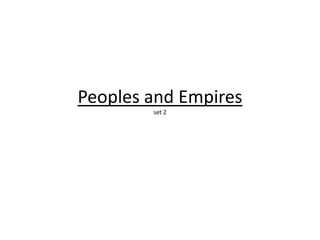Report
Share

Recommended
Recommended
More Related Content
What's hot
What's hot (20)
Interesting biographies related with Prehistory in the Iberian Peninsula

Interesting biographies related with Prehistory in the Iberian Peninsula
Biiographies about some important Kings from the Metal Ages in the Iberian Pe...

Biiographies about some important Kings from the Metal Ages in the Iberian Pe...
Similar to People and empires
Similar to People and empires (16)
W7L3European Age of ExplorationA World Map from Alberto Cantin.docx

W7L3European Age of ExplorationA World Map from Alberto Cantin.docx
CHAPTER 2Early Globalization The AtlanticWorld, 1492–16.docx

CHAPTER 2Early Globalization The AtlanticWorld, 1492–16.docx
11216 Syllabus overviewPrimary vs secondary sources11416.docx

11216 Syllabus overviewPrimary vs secondary sources11416.docx
131 Germanic Kingdoms Unite Under Charlemagne 119768854268028 5

131 Germanic Kingdoms Unite Under Charlemagne 119768854268028 5
74 Medieval and Renaissance Originsemosynary function assu.docx

74 Medieval and Renaissance Originsemosynary function assu.docx
People and empires
- 1. Peoples and Empires set 2
- 2. Chapter 3 Universal Empire This Chapter mainly talks about the shelf's in power through out Europe around 742 to mid 1500. Over all Europe stayed on top “civilization” wise during this period. Romans survival relied mainly on the Pope who owned most of southern and central Italy at the time. It also talked about the Pope and Charlemagne kind of working together. Charlemagne also know was Charles the first, was ruler of the Frankish people. It also talked about how around 1200 each of the kings started forking off and began claiming themselves as emperor of there own kingdom which lasted for 700 years. Then around the early 1500 Charles V inherited the thrown and started expanding Romans territory more so then any other pervious leader. His idea of conquering the world. When he sailed out to conquer Castile and Aragon, the sails on the boat stated “Further Beyond” rather then no further beyond which was previously stated about the ocean by the ancients. Charles V ran his empire kind of sketchy. There was no capital and no one really spoke the same language. Charles V
- 3. Chapter 4Conquering the Ocean This Chapter started by talking about European maps. Before the late eighteenth century the perspective of Europe was extremely unproportional. Geographical uncertainly. For example Alessandro Farnese once believed that Holland was an island. Most ancient geographers believed the world consisted of one large chuck of land which was divided into Europe Africa and Asia. Finally during 1434 a small fleet of fishing boats shipped out to explore the unknown waters of west Africa. By the mid-seventeenth century the Europeans dominated trade. They controlled most of the Atlantic and were “the most powerful trading presences in the Indian ocean”. Immigration changed forever because of rapid trade.
- 4. Chapter 5Spreading the Word This Chapter talks about how Emperors during the third century A.D. were looked upon as choice by god. A lot of the Romans religious believes came from the “Patria”. An expression of a community and the “willing to sacrifice one’s life for the common good”. The Romans believed that God gave them the task of becoming a kind of warrior society. They thought there task was to united the world as one after the coming of Christ. Bartolome de Las Casas became “the defender and apostle to the Indians” During 1543 he became made bishop of Chiapas in southern Mexico. He set together kinds of missionaries that would have existed if the Spanish had not come to colonies.
